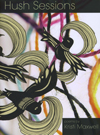Hush Sessions
As the epigraph from Gertrude Stein suggests, Hush Sessions is a collection of poetry interested in wordplay, but Kristi Maxwell’s new book also assesses ways of approaching intimacy and fertility in long-term relationships. By presenting the body as imperfect, these poems expose the disappointment a lack of control brings.
As the epigraph from Gertrude Stein suggests, Hush Sessions is a collection of poetry interested in wordplay, but Kristi Maxwell’s new book also assesses ways of approaching intimacy and fertility in long-term relationships. By presenting the body as imperfect, these poems expose the disappointment a lack of control brings.
The collection is dominated by long series, poems that stretch up to sixteen pages in length. These episodic mini-epics chronicle battles between the speaker and the body. Three long poems, “Like the Earth, 2/3rds Water,” “Imperative,” and “Hush Sessions,” detail a medical misadventure in which the speaker addresses her ovaries, heart, and veins, often employing Steinian wordplay. “Like the Earth” contains a section that begins, “Aortic Valve – yes, I resort to your full name,” and then goes on to describe the body’s systems: “the body has nine / which should have clued me in to ‘no’ sounds like nein / sounds like blood, where are you?”
Maxwell’s poems smoothly exist in multiple worlds at the same time, describing a bodily failure while engaging in linguistic play, implying that the speaker should have used knowledge about language to predict her body’s behavior. The movement from “nine” to “nein” transcends mere homophonic delight when Maxwell employs the denotation of each word to serve the meaning of the poem in which they appear.
“Imperative” concerns itself with the response to illness, containing corporeal words such as “leukocyte,” “artery,” and “disease.” Yet it is difficult not to read the poem as specifically about the fallout resulting from a miscarriage. It begins:
antibodies oust the virus from a body –
pro-body antibodies
I virus I
vie
to keep you
The ways in which the body lets the speaker down are various, personal, and felt. The verbs Maxwell uses indicate the intimate nature of the speaker’s loss: “yes I begrudge,” “I asked your body,” “I clotted your mouth.” The sparseness of this poem mirrors the emptiness it and many other poems in the collection seek to describe and reproduce.
The title poem documents an attempt to resolve a fertility problem with institutional intervention. It is this piece that best deploys Maxwell’s strongest techniques. Though at times in the collection the homophonic wordplay is flat, a cute pair of words (“called. Culled.”) rather than an interrogation of language (“which she liked like the wet center / of a poached egg, which she liked”), in this poem the shout-outs to Gertrude Stein hum and sing.
The last few poems in the collection address infidelity in marriage and color the husband as problematic. In “Dominant,” the husband “was a blizzard that holed the Fourth [wife] / in his house.” The poem “Scrap for Grappling” is in the form of a Q&A on how a wife should respond to a cheating husband. Perhaps these closing poems are an effort toward answering the difficult questions raised in the rest of the book. If so, the answers are not pleasant or easy. This sounds about right.





